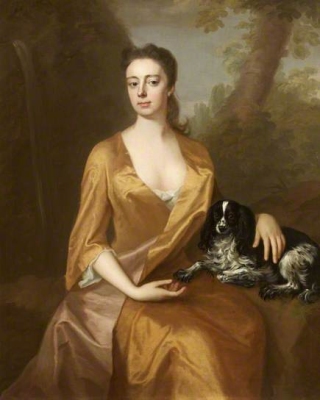 |
| Our friend Aphra. |
A couple of years ago I had the privilege to teach an
upper-level English course at Stony Brook on a topic of my choice. Since the
department was looking to run an upper-level course on poetry, I proposed
(successfully) to teach a course on eighteenth-century women poets. It was an
exhilarating experience in many ways, as the students were mostly unfamiliar
with eighteenth-century literature or culture. Together we explored the
fabulous voices of female poets starting with Aphra Behn and Anne Finch and
ending with Joanna Baillie and Mary Robinson.
One thing that particularly struck me was how often women
wrote about writing, specifically, about being female poets and the challenges
therein.
Elizabeth Thomas’s poetry is filled with the anger and frustration of being told (apparently) many times over that poetry was not “fit
for women,” as in her poem, “On Sir J---- S---- saying in a Sarcastic Manner,
My Books would make me Mad. An Ode”:
Unhappy sex! how hard’s our fate,
by Custom’s tyranny confined
To foolish needlework and chat,
Or such like exercise as that,
 |
| Lady Mary Chudleigh |
But still denied th’ improvement of our mind!
(1722)
In these lines, she reiterates, almost to the letter, the
earlier complaints of Mary, Lady Chudleigh in “The Lady’s Defense”:
‘Tis hard we should be by the men despised,
Yet kept from knowing what would make us prized;
Debarred from knowledge, banished from the schools,
And with the utmost industry bred fools;
Laughed out of reason, jested out of sense,
And nothing left but native innocence;
Then told we are incapable of wit,
And only for the meanest drudgeries fit
(1701)
Sarah Egerton’s “The Emulation” (1703), Elizabeth Tollet’s
“Hypatia” (1724), Mary Leapor’s “An Essay on Woman” [not an essay…a poem]
(1746), and Anna Laetitia Barbauld’s “The Rights of Woman” (c. 1795) elaborate
similar themes of being withheld from knowledge and education all the while
being told that, as women, they were silly, useless or incapable of bettering
themselves.
Poems like Anne Finch’s “The Introduction” (1713?) and
Esther Lewis’s “A Mirror for Detractors. Addressed to a Friend” (1748) more
specifically discuss the problem of being a woman poet:
 |
| Anne Finch |
Alas! a woman that attempts the pen,
Such an intruder on the rights of men,
Such a presumptuous creature, is esteemed,
The fault can by no virtue be redeemed
--From “The Introduction”
…when a woman dares indite,
And seek in print the public sight,
All tongues are presently in motion
About her person, mind, and portion;
And every blemish, every fault,
Unseen before, to light is brought
--From “A Mirror for Detractors”
For those of us who study the literary output of the
ladies of the eighteenth century, such sentiments are probably expected from
our literary foremothers. For my students, however, they were a wonderful
illustration of the limited rights and position of women in the eighteenth century.
Even for myself, the anguish, chagrin, frustration and outright anger of these
women was palpable in these poems in a way that was immediate and unmediated,
and I started using them in introductory women’s studies courses as a way of
foregrounding later nineteenth- and twentieth-century women’s right movements.
As usual, the past reasserts itself in the present,
however, and I find these poems still illustrate the frustrations of women
writers writing now. Countless articles have appeared lately about how women
writers are constantly belittled and their output discounted by publishers and reviewers, as well as how women’s novels are often marketed with “softer” “more
feminine” book covers. All this, despite the fact that women now edge out men
in pursuit of bachelor’s degrees in the United Stated. We no longer lack the
education, but we are still marginalized when it comes to reviews and
marketing.
Similarly, the poetry of women is, in my experience,
under-taught at the undergraduate level. When I mentioned to a colleague (a
male Romanticist) that I was teaching a course on “eighteenth-century women
poets,” he (half-) jokingly replied, “Oh, were there any?” If he looked at
almost any general literary anthology, however, he might surmise that there
certainly weren’t enough to make an entire course syllabus just on them alone.
No comments:
Post a Comment